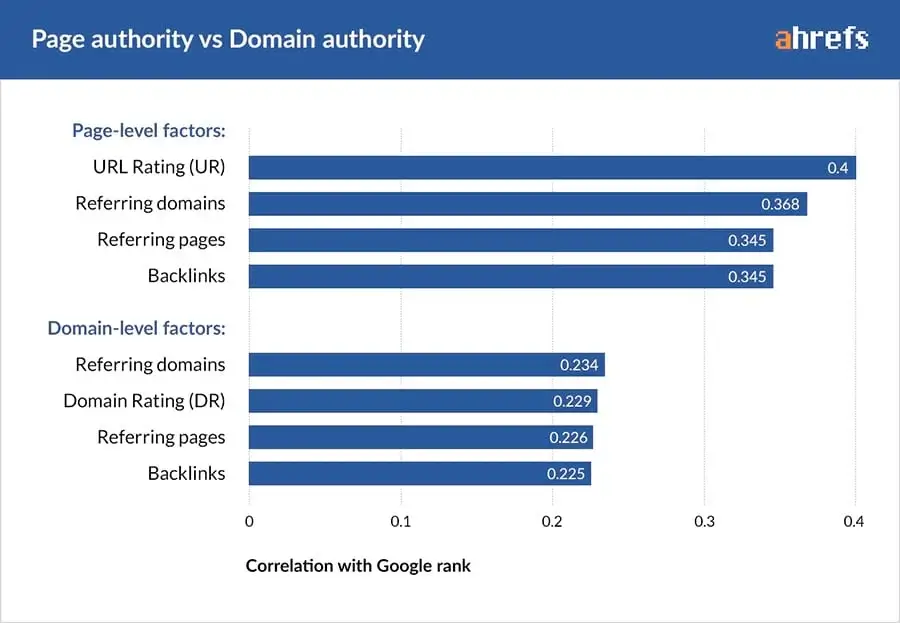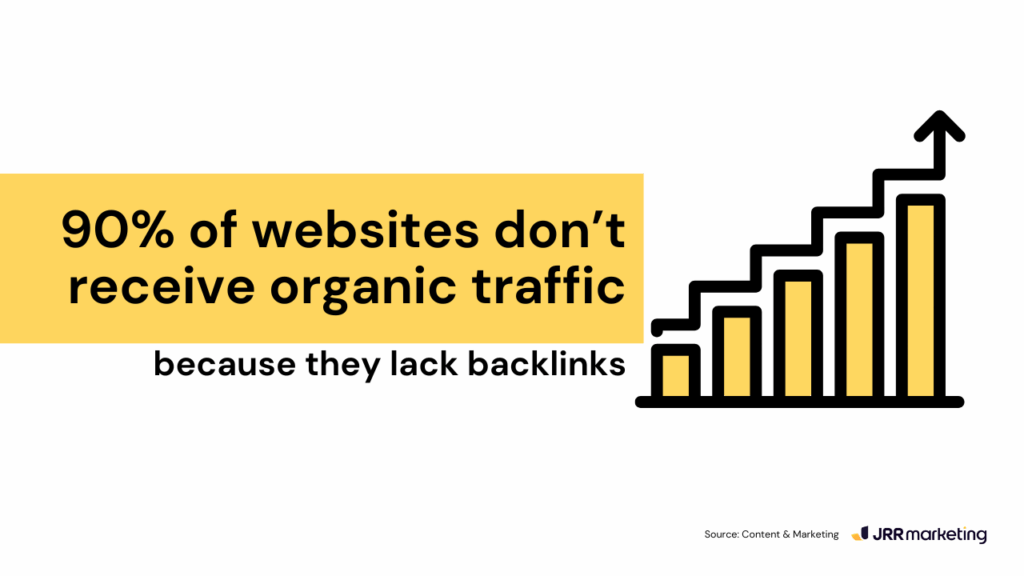Key takeaways
- Domain authority builds trust across your site, but it only grows with time and steady backlinks.
- Page authority gets you faster results by helping individual pages rank with direct backlinks and smart internal linking.
- Good SEO basics lift both. Your content gets easier to crawl, more helpful for people, and shows up better in search.
Domain authority (DA) and page authority (PA) get thrown around a lot in SEO.
But most people don’t know how they’re different.
Or why they even matter.
Google doesn’t officially reveal how its algorithm ranks websites.
That’s where third-party tools like Moz come in.
They made their own scores to help people estimate how likely a site or page is to rank.
Each score goes from 1 to 100.
Of course, the higher the score the better it’s likely to perform in search rankings.
What’s “good” depends on your niche or industry.
If your competitors have scores around 30 to 50, then that should be your benchmark.
Generally, a score of 40-60 for both DA and PA usually means you’re doing well.
But the scale isn’t linear.
It’s much easier to move from 20 to 30 than from 70 to 80.
Each point gets harder to earn the higher you go.
Of course, these scores aren’t perfect.
They are, however, quite handy for spotting trends.
And, they don’t measure the same thing.
They each look at different parts of your site.
And they each respond to different SEO tweaks.
So if you want better rankings, more traffic, and backlinks that get your more results, you’ve got to know how they work.
And how to grow both.

What domain authority and page authority actually mean
Domain authority gives your whole site credibility.
You need domain authority to build trust with search engines across your whole domain.
Page authority, on the other hand, pushes specific pages to the top of search results.
Think blog posts, landing pages, or service pages that drive leads and traffic.
Domain authority scores show how strong your domain is overall.
It looks at how many quality backlinks point to your site, how trustworthy those links are, and how well your domain has performed over time.
The higher your Domain Authority, the better chance all your pages have at ranking.
Page authority is more targeted.
It checks how many backlinks a specific page has, who they’re from, and how strong those links are.
A page with high page authority can rank well even if the rest of your site is still growing.
But, even with those definitions, there’s a lot more going on under the hood.
Domain authority and page authority may sound similar.
But, again, they work very differently.
Let’s break down the four key differences between them that matter.
The 4 biggest differences between domain authority vs page authority (and how to improve both)
#1 — Slow to grow vs quick to rank
Domain authority takes time to grow.
It needs a steady flow of high-quality backlinks across your whole site.
That means publishing consistently, earning mentions from trusted sources, and slowly building your reputation.
You won’t see big jumps overnight.
It only grows if you’re consistent with your SEO efforts.
This means creating content people actually search for.
Pitch guest posts to sites in your niche with solid authority.
Run digital PR campaigns that earn links from trusted sources.
And don’t forget your technical SEO.
Fix broken links.
Clean up redirects.
Make sure your site is easy to crawl.
All of this slowly builds your domain’s strength.
Page authority works faster.
One strong backlink can push a single page up the rankings in days.
Or even faster if the site linking to you is highly trusted and relevant.
So, start with pages that are already at the bottom of page one or top of page two.
Add internal links from your high-authority pages.
Refresh the content with updated stats, clearer headings, or better calls to action.
Target those pages with links from solid sources.
Look for blogs, forums, and directories that fit your niche.
#2 — Domain-wide backlinks vs page-specific backlinks

Domain authority grows when you earn backlinks across many different pages on your site.
That tells search engines your whole domain is valuable,
If all your links go to one place, the rest of your site stays weak.
So, make sure you have a diverse backlink profile.
Blog posts, service pages, even FAQs should get links.
The wider the spread, the stronger your domain becomes.
When building backlinks, pitch content from all over your site.
This helps Google trust your whole domain.
Page authority works differently.
It gets stronger when backlinks point directly to that specific page.
If you want a page to rank, build links to that specific page.
Not your homepage.
Not a related blog.
Of course, you need to make sure it’s worth linking to.
It should have something clear, useful, and unique.
Then promote it directly through outreach, guest posting, or internal campaigns.
#3 — Internal links move pages vs nudge domains
Internal links matter more forpage authority than domain authority.
They help pass link equity from strong pages to weaker ones.
If you’ve got a blog post pulling in lots of backlinks and traffic, it has authority to spare.
Link from it to pages that need a lift.
This flow helps search engines crawl your site and see what matters.
It also shows them the target page is relevant.If a page has low PA, start by checking what’s linking to it internally.
The fix is simple.
Add internal links from high-PA pages to those that are underperforming.
Use anchor text that clearly explains what the target page is about.
Avoid vague links like “click here” or “read more.”
Be specific and relevant.
This helps search engines make better sense of your content… and rank it higher.
#4 — Site-wide strength vs page-level focus
Domain authority helps you build trust at scale.
It helps you compete in tough niches and rank for broad, competitive topics over time.
If you want your site to rank across many keywords and categories, you need a strong DA backing it up.
Page authority is more focused.
It helps single pages rank fast for specific keywords.
This is perfect for quick wins, especially if you can’t waitfor your whole site to catch up.
What to do depends on your goals.
Use domain authority to plan your overall SEO strategy.
They’re bencmarks for how competitive you can be and where you need to focus your efforts.
Either way, keep your site structure clean so search engines can crawl it without hitting dead ends.
Use clear, descriptive URLs that tell people, and bots, what the page is about.
Keep publishing authoritative content that earns links, keeps people on the page, and shows your expertise.
Don’t forget to optimise your on-page SEO.
Your page needs to look good to search engines, not just people.
Start with your title tags(H1, H2, H3).
Make them clear, clickable, and keyword-friendly.
Also, add alt text to images so they know what’s there.
Structure your content clearly.
Make it helpful.
Do keyword research and use them organically without stuffing them.
This is how you combine trust and speed to get the best results.
Domain authority vs page authority isn’t either/or
You need both domain authority and page authority to grow in search.
They’re stronger together.
DA builds long-term trust.
It helps you rank for tougher, broader keywords.
PA brings speed.
It helps individual pages climb faster while your wider strategy is still ramping up.
But not everyone has the time or resources to grow both at the same time.
And that’s totally fine.
If your site’s new, focus on domain authority first.
Start with solid backlinks, helpful content, and clean technical SEO.
If your site already has content, shift to page authority.
Find the pages that are close to ranking and give them a push.
Just don’t obsess over the numbers.
Remember, these are just numbers and scores that third-party tools came up with.
Google may be using a very different system to rank pages.
They won’t guarantee rankings.
But they’ll show you where to aim.
This way, you can focus on the results that matter to you.


